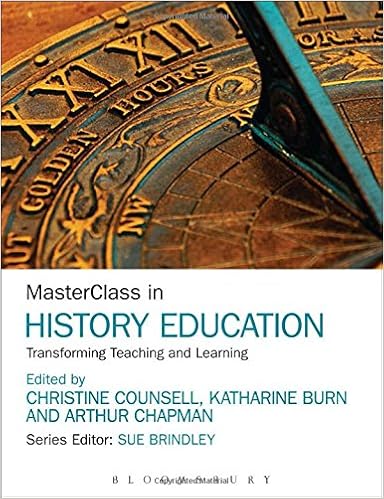
By Peter T. Knight
ISBN-10: 0304339830
ISBN-13: 9780304339839
ISBN-10: 0304339849
ISBN-13: 9780304339846
ISBN-10: 082644461X
ISBN-13: 9780826444615
Read or Download Masterclass: Learning, Teaching PDF
Best certification & development books
This booklet demonstrates the complementarity of academic and coaching ways to constructing intercultural competence as represented by means of those that paintings in advertisement education and those that paintings in extra and better schooling. It does so through offering chapters of study and chapters describing classes within the sectors.
New PDF release: How Learning Works: Seven Research-Based Principles for
Distilling the learn literature and translating the medical procedure into language suitable to a faculty or college instructor, this publication introduces seven basic ideas of ways scholars research. The authors have drawn on study from a breadth of views (cognitive, developmental, and social psychology; academic learn; anthropology; demographics; organizational habit) to spot a suite of key ideas underlying studying, from how potent association complements retrieval and use of data to what affects motivation.
Get Totally Positive Teaching: A Five-Stage Approach to PDF
Self-discipline difficulties, constrained assets, crowded study rooms. lecturers face many concerns on a daily basis which may put on down their love of schooling. How can they remain centred and energized day in and trip? In absolutely confident educating, Joseph Ciaccio stocks an procedure that reworked him from a burned-out veteran instructor suffering joylessly via every day to a pro who has enjoyable along with his scholars, guiding them to luck whereas having fun with the instructing procedure.
Roger Pask; Barrie Joy's Mentoring-coaching : a guide for education professionals PDF
This e-book explores the foundations at the back of winning mentoring-coaching in schooling. in addition to highlighting the various advantages of mentoring-coaching, it addresses hugely useful matters comparable to: Can someone discover ways to be a mentor-coach? What behaviour counts as mentoring-coaching? How do i do know what to do, in what order and the way?
- Better Answers:Written Performance That Looks Good and Sounds Smart, Second Edition
- Meeting the Needs of Second Language Learners: An Educator's Guide
- The New Teacher's Handbook: Practical Strategies & Techniques for Success in the Classroom from Kindergarten Through High School
- A Practical Guide to Teaching Design & Technology in the Secondary School (Routledge Teaching Guides)
- Supervising Student Teachers The Professional Way: Instructor's Guide, 7th Edition
Extra resources for Masterclass: Learning, Teaching
Sample text
Although the AAC recognized that this research was limited both in scale and by its concentration on advertised entry requirements, it believed that it was sufficient to confirm that entry requirements by themselves would not provide an adequate benchmark by which to define the character of postgraduate level awards. There were clear differences in entry requirements across subjects and between institutions. AAC considered that it might be more fruitful to specify clearly defined and measurable outcomes for master's level work.
As the CNAA account had not proved useful, the AAC looked at other attempts, both in the UK and overseas, to provide generic descriptors of level. This included two projects funded by the Department for Education and Employment, based in the Welsh Access Unit and the South East England Consortium (SEEC), which between them covered 50 institutions. They were working on providing generic descriptors of level. The SEEC consultation document actually came out too late for full consideration but early indications suggested that the approach being adopted would not resolve the critical issues attaching to the practice of people following master's courses on subjects or areas that they had never previously studied, nor would it resolve the differences between master's courses that were at 21 Masterclass postgraduate level as compared to those that might better be characterized as post-experience.
By looking at a complete programme (where Davis described components of a programme) he shows how far curriculum and course design, assessment and teaching arrangements have diverged from those of the traditional undergraduate programme. In doing so, he not only presages a theme of subsequent chapters, but also recalls earlier discussions of the need for flexible programmes that meet learners' needs and of the problem of defining appropriate standards for what tends to be non-traditional work. An implication of this, and of other chapters, is that such programmes make substantial demands on academics, both at the design and at the implementation stages.
Masterclass: Learning, Teaching by Peter T. Knight
by Brian
4.5



